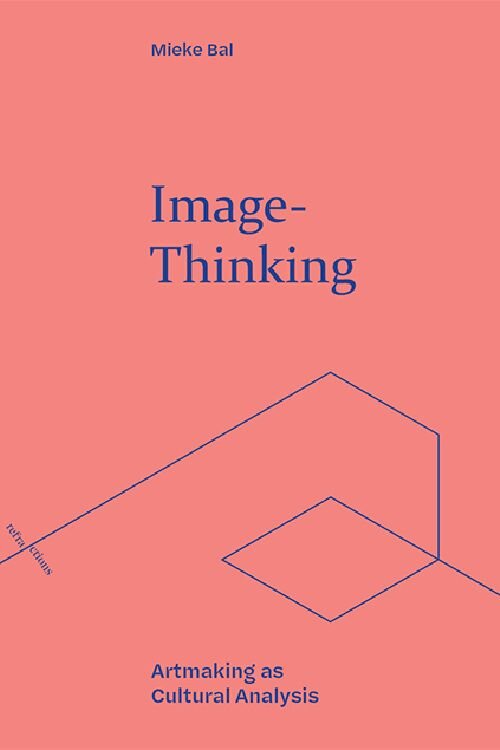
Image-Thinking: Artmaking as Cultural Analysis
Author: Mieke Bal
Publisher: Edinburgh University Press
Published March 2022 (Paperback & Hardback)
In this rich, highly illustrated book, Mieke Bal takes us on a journey through the range of her work, using the concept of image-thinking as a point of connection between cultural analysis and artistic practice. Sharing a lifetime of experience of writing about art, making films and installations, as well as curating exhibitions, she shows us how these may be brought into dialogue with insights from theory.
To order, click here.
Pre-order discount code (30% off): NEW30.
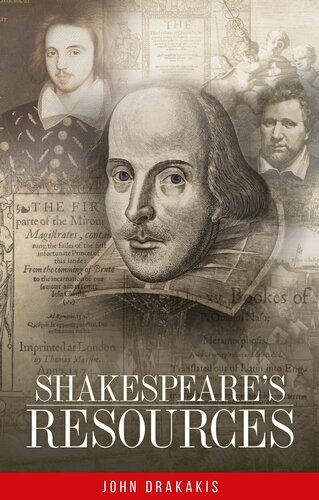
Shakespeare's resources
By John Drakakis
Manchester University Press, 2021
Click here to order.
Geoffrey Bullough's The Narrative and Dramatic Sources of Shakespeare (1957-75) established a vocabulary and a method for linking Shakespeare's plays with a series of texts on which they were thought to be based. Bullough also established a critical methodology that depends upon locating a hierarchy of texts which, when identified, can take us back both to the mystery and to the moments of creation. Shakespeare's Resources revisits and interrogates the methodology that has prevailed since then and proposes a number of radical departures from Bullough's model. The tacitly accepted linear model of 'source' and 'influence' that critics and scholars have wrestled with is here reconceptualised as a dynamic process in which texts, and non-textual narratives, interact and generate meanings that domesticated versions of intertextuality do not adequately account for. Shakespeare, the drama to which he contributed, and the culture of which he was a part existed on the cusp of the emergence of a relatively new and rapidly developing technology: print culture, and some of the material to which he had access existed in the receding oral culture of the period. In the present, the rapid development of electronic media and the impact that it is having on our ways of articulating experience and our thinking, while not being identical to the early modern crisis in communication, sharpens our sense of how we generate, receive and circulate narratives, and prompts us to look back to historical moments in which sensibilities were transformed. Our own emphasis on ‘reading’ has encouraged us to think that this was a universal activity, although the comic You-tube account of the encounter between a medieval monk, and a contemporary reader attempting to convince him of the advantages of ‘the book’ as a convenient receptacle for information along with the skills necessary to extract it, reminds us of what we now take for granted. Shakespeare’s Resources seeks to uncover and explore questions of exactly how Shakespeare 'read', what he read, the practical conditions in which narratives were encountered, and how he re-deployed earlier versions that he had used in his later work. It seeks to depart from the method of simply accumulating ‘sources’ and of adding incrementally to a hypothetical ‘library’ to which Shakespeare is thought to have had access. Almost half of the plays attributed to him had no independent printed existence until 1623, some seven years after his death, and so far as we know he seems to have had very little to do with the printing of those that appeared in various quartos while he was alive. Attempts to link Shakespeare with an exclusively ‘literary’ culture, emanating from the lead that Bullough provided, have proved unsatisfactory in that they do not fully account for the contingent nature of the early modern business of playwriting and performance. Shakespeare’s Resources aims to challenge the methodological foundation upon which the ‘literary’ Shakespeare is based and to propose a rethinking that situates his work on the cusp of a residual but still dynamic oral culture, and a rapidly developing culture of the book, a culture that in the early modern period was sufficiently unstable to bear the traces of its immediate pre-history.
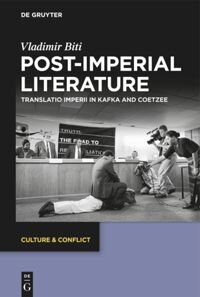
Post-imperial Literature - Translatio imperii in Kafka and Coetzee
Vladimir Biti
Volume 20 in the series "Culture & Conflict", De Gruyter
Click here to order.
This book proposes a new departure point for the investigation of transnational literary alliances: the traumatic constellation of translatio imperii, which followed the dissolution of the East-Central European empires in the 1920s and the crumbling of the West European colonial empires in the 1950s. To prevent their breakdown, the former transitioned from a ‘sovereign’ to a ‘disciplinary’ mode of administration of their peripheries, the latter from the merciless assimilation of their colonial constituencies to their affirmative regeneration. This book treats Franz Kafka as the writer of the first transition, prefiguring J. M. Coetzee as the writer of the second. In a series of close readings, it investigates the particular ways in which the restructuring of power relations between the agencies in their fictions is a response to the delineated post-imperial reconfiguration of the new countries’ governmental techniques. By displacing their narrative authority beyond the reach of their readers, they laid bare the sudden withdrawal of transcendental guarantees from the world of human commonality. This entailed an unstable and elusive configuration of their fictional worlds as a key feature of post-imperial literature.
The Birth and Death of Literary Theory: Regimes of Relevance in Russia and Beyond
Galin Tihanov
Stanford University Press, 2019
Winner of the 2020 AATSEEL Best Book in Literary Studies, sponsored by the American Association of Teachers of Slavic and East European Languages.
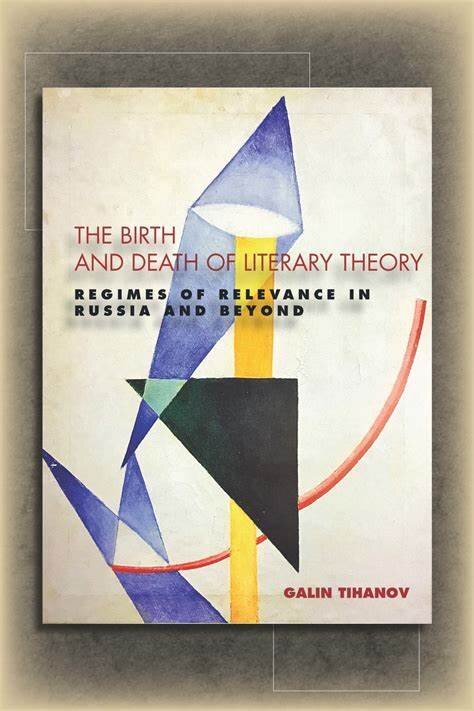
Until the 1940s, when awareness of Russian Formalism began to spread, literary theory remained almost exclusively a Russian and Eastern European invention. The Birth and Death of Literary Theory tells the story of literary theory by focusing on its formative interwar decades in Russia. Nowhere else did literary theory emerge and peak so early, even as it shared space with other modes of reflection on literature. A comprehensive account of every important Russian trend between the world wars, the book traces their wider impact in the West during the 20th and 21st centuries. Ranging from Formalism and Bakhtin to the legacy of classic literary theory in our post-deconstruction, world literature era, Galin Tihanov provides answers to two fundamental questions: What does it mean to think about literature theoretically, and what happens to literary theory when this option is no longer available? Asserting radical historicity, he offers a time-limited way of reflecting upon literature—not in order to write theory's obituary but to examine its continuous presence across successive regimes of relevance. Engaging and insightful, this is a book for anyone interested in theory's origins and in what has happened since its demise.
Click here to order.
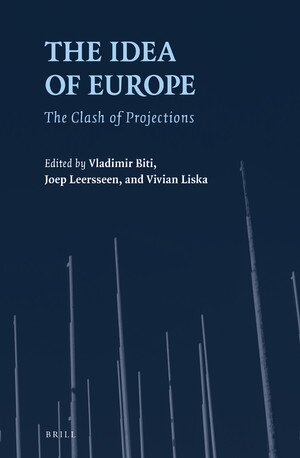
The Idea of Europe - The Clash of Projections
Volume editors: Vladimir Biti, Joep Leerssen, and Vivian Liska. Brill. Series: European Studies, Volume: 37
Click here to order.
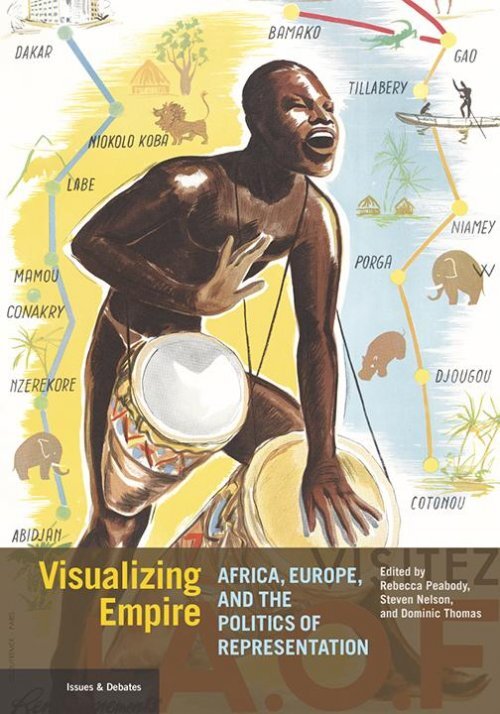
Visualizing Empire: Africa, Europe, and the Politics of Representation
Edited by Rebecca Peabody, Steven Nelson, and Dominic Thomas [Member #3957]
Los Angeles: Getty Books, 2021
An exploration of how an official French visual culture normalized France’s colonial project and exposed citizens and subjects to racialized ideas of life in the empire.
Click here to order.
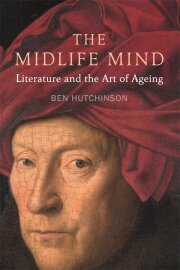
The Midlife Mind Literature and the Art of Ageing
Ben Hutchinson
The meaning of life is a common concern, but what is the meaning of midlife? With the help of illustrious writers such as Dante, Montaigne, Beauvoir, Goethe and Beckett, The Midlife Mind sets out to answer this question. Erudite but engaging, it takes a personal approach to that most impersonal of processes, ageing. From the ancients to the moderns, from poets to playwrights, writers have long meditated on how we can remain creative as we move through our middle years. There are no better guides, then, to how we have regarded middle age in the past, how we understand it in the present, and how we might make it as rewarding as possible in the future.
Click here to order.
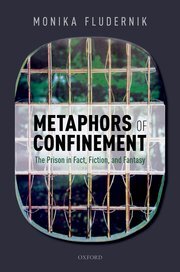
Metaphors of Confinement: The Prison in Fact, Fiction and Fantasy
Monika Fludernik
Law and Literature series (ed. Robert Spoo and Simon Stern)
Oxford: Oxford University Press, 2019. 804 pp.
- Examines how literature depicts imprisonment
- Combines law and literature studies with cognitive metaphor theory and historical analysis
- Raises topical issues about the ethics of irmprisonment and provides a comparative and deeply historical inquiry into the place of the prison in our imagination and world views
- Illustrates the interplay of recurrent tropes and changing historical conditions enabling readers to follow metaphors through the historical development of specific genres and to contrast divergent deployments of the same metaphor in different discourses of the same period
Click here to order.
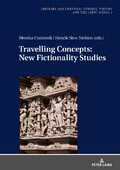
Travelling Concepts: New Fictionality Studies
Edited by Monika Fludernik and Henrik Skov Nielsen
Frankfurt: Lang, 2020
This collection of essays re-examines the much discussed fact-fiction distinction in light of the current burgeoning of research on fictionality. It provides a forum for ongoing work on fictionality from France, Germany and Denmark and Sweden. By placing discussions of the notion of fictionality in one volume, the editors hope to initiate exchange between the different traditions represented in the essays and to help the task of translating the available concepts and terminologies so they can travel between different models and theoretical frameworks.
Click here to order.
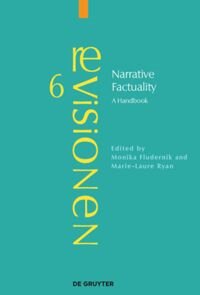
Narrative Factuality. A Handbook.
Edited by Monika Fludernik and Marie-Laure Ryan
Revisionen, 6. Berlin: de Gruyter, 2019
The study of narrative—the object of the rapidly growing discipline of narratology—has been traditionally concerned with the fictional narratives of literature, such as novels or short stories. But narrative is a transdisciplinary and transmedial concept whose manifestations encompass both the fictional and the factual. In this volume, which provides a companion piece to Tobias Klauk and Tilmann Köppe’s Fiktionalität: Ein interdisziplinäres Handbuch, the use of narrative to convey true and reliable information is systematically explored across media, cultures and disciplines, as well as in its narratological, stylistic, philosophical, and rhetorical dimensions. At a time when the notion of truth has come under attack, it is imperative to reaffirm the commitment to facts of certain types of narrative, and to examine critically the foundations of this commitment. But because it takes a background for a figure to emerge clearly, this book will also explore nonfactual types of narratives, thereby providing insights into the nature of narrative fiction that could not be reached from the narrowly literary perspective of early narratology.
Click here to order.
The Oxford Handbook of Decadence
Edited by Jane Desmarais and David Weir
The Oxford Handbook of Decadence includes discussion of the various literary manifestations of decadence, from the classical era to the present.
For more information, please visit the publisher's website.
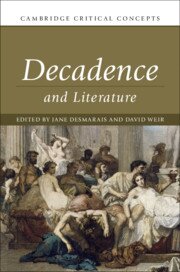
Decadence and Literature
Edited by Jane Desmarais and David Weir
Part of the Cambridge Critical Concepts series
Decadence and Literature explains how the concept of decadence developed since Roman times into a major cultural trope with broad explanatory power. No longer just a term of opprobrium for mannered art or immoral behaviour, Decadence today describes complex cultural and social responses to modernity in all its forms.
For more information, please visit the publisher's website.